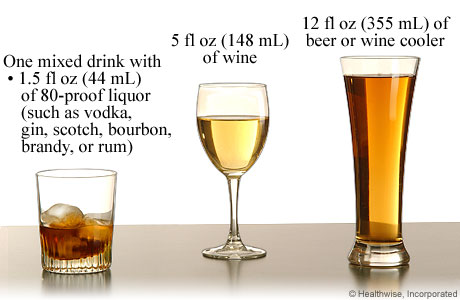
Too much alcohol affects multiple organs of the body from the brain to the small intestine. Excessive alcohol consumption places an individual at increased risk for:
- liver cirrhosis
- chronic pancreatitis
- obesity
- high blood pressure
- nutritional deficiencies and
- various cancers
The harmful effect of alcohol depends on:
- a person’s age
- the amount consumed
- the frequency of alcohol consumption
- health status and
- family history

How drinks measure up. Limiting alcohol intake to the standard recommendations can help prevent unwanted health disturbances
If heavy drinking or binge drinking occurs frequently, an individual may be at risk for nutritional deficiencies. Common deficiencies include:
Folate
Folate is absorbed in the gut and a deficiency can cause megaloblastic anemia (weakness, fatigue, irritability, heart palpitations, and shortness of breath). Alcohol interferes with folate absorption and increases folate losses in the kidney.
Fat soluble vitamins
Alcohol inhibits fat absorption which means that Vitamin A, Vitamin D, and Vitamin E cannot be absorbed effectively. These vitamins are important for vision, bone strength, and total health.
Alcohol in moderation (2 drinks per day for men, 1 drink per day for women) has been shown to benefit the heart. Risk of heart disease in moderate alcohol drinkers is lower than that in non drinkers. However, if you don’t drink, it is not recommended that you start because it is not possible to predict which individuals may have problems with alcoholism.
Limiting alcohol intake can improve overall health and lead to a healthier you. Take the alcohol quiz to see if you can limit your alcohol consumption and the rethinking drinking quiz to find out your risk for alcohol related health issues.
Deidra Nelson is a dietetic intern at the Memphis VA Medical Center.
Topics in this story
More Stories
The Social Security Administration is hoping to make applying for Supplemental Security Income (SSI) a whole lot easier, announcing it will start offering online, streamlined applications for some applicants.
Yusuf Henriques, an Army Veteran and former combat medic, is the founder and CEO of IndyGeneUS AI, a genomics company on a mission to improve health equity by increasing representation of women and racial minorities in clinical trials.
Online shopping scams are the riskiest scam for Veterans, with 77.3% of reports confirmed losing money when targeted by this scam.








If you stop or slow down is there ways to make things better
before things get worst